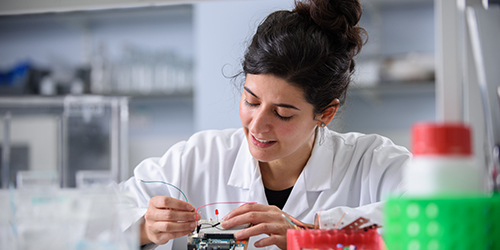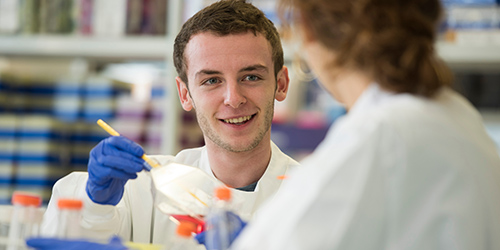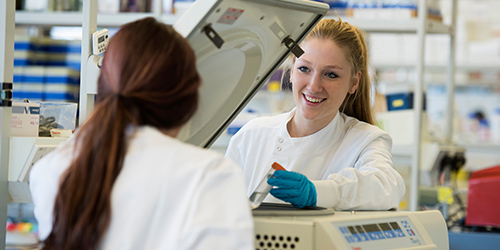Cellular and Molecular Medicine
Our range of in-depth courses examine the fundamental mechanisms of devastating diseases and explore how science can discover new ways to treat them.
First-class facilities
Our outstanding facilities include state-of-the-art teaching and research labs and a unique online lab manual.
Turn science into medicine
Work with experts to understand the cellular and molecular basis of disease and how discoveries can be translated into life-changing applications.
Leading department
Bristol is in the UK top 10 for Biological Sciences (QS World University Rankings by Subject 2024).
Cellular and Molecular Medicine courses for 2025
Single Honours
- BSc Cancer Biology and Immunology (B131)
- BSc Cancer Biology and Immunology with Study in Industry
- BSc Cellular and Molecular Medicine (B130)
- BSc Cellular and Molecular Medicine with Study in Industry
- BSc Medical Microbiology (C521)
- BSc Medical Microbiology with Study in Industry
- BSc Virology and Immunology (C540)
- BSc Virology and Immunology with Study in Industry
- MSci Cancer Biology and Immunology (B132)
- MSci Cellular and Molecular Medicine (B133)
- MSci Medical Microbiology (C522)
- MSci Virology and Immunology (C541)
Cellular and Molecular Medicine at Bristol
Our aim is to inspire you to turn science into medicine. Our flexible courses offer focused training in biomedical sciences through the study of the cellular and molecular basis of human disease.
Taught by an international team of research scientists and clinicians, you will have the opportunity to complete a research project of your own that reflects our research interests in cancer biology, stem cell biology and regenerative medicine, or infection and immunology.
In lectures, you'll study concepts at the forefront of knowledge about the mechanisms of human disease. Our teaching reflects our research, which aims to translate laboratory discoveries into clinical applications.
Laboratory sessions underpin learning during the first two years and are integrated with eBiolabs online resources. Through project work, you will develop experimental design and problem-solving skills.
Our innovative teaching includes resources designed to prepare you for practical classes by demonstrating concepts and experiments through animations, videos and pre-lab quizzes.
We welcome applications from students who are also applying for medicine.
We also offer Biochemistry, Biological Sciences, Biomedical Science, Neuroscience, Pharmacology, Physiological Science and Psychology.
My course is as challenging as it is interesting. We have great support from the teaching and administrative staff. Bristol is a great University in a beautiful city - I think it speaks for itself!
Career prospects

Many of our graduates go on to study for an MSc or PhD prior to a career in biomedical research or go on to study medicine.
Other graduates find employment in the biotechnology or pharmaceutical industries, work in academic or clinical laboratories, or choose to use their transferable skills in health services or non-scientific careers.
Course structure

The first year will introduce you to topics including microbiology and infectious diseases; cell biology of normal and tumour cells; pathology and immunology; and biochemistry.
Year two will build on the broad foundation of year one. You will take core units including:
- Infection and Immunity
- Cellular and Molecular Pathology
- Recombinant DNA Technology
- Gene Expression and Rearrangement.
In the final year, you will take units that appeal to your interests and apply your research skills in a project taking place within the school or in a laboratory at a nearby hospital.
We offer four-year MSci courses that include an additional research-intensive final year.
There is a great deal of flexibility and it is possible to transfer between courses as your interests develop. You can also transfer to one of our four-year Study in Industry degrees if you secure a placement during year two.
Employability and enterprise skills are part of all our degrees, and you'll graduate with an impressive range of transferable skills.
Student satisfaction

You'll join a close-knit and supportive community. 96% of surveyed cellular and molecular medicine students said their course is intellectually stimulating and 91% agreed that staff are good at explaining things (NSS 2022).
Our courses also help develop career-ready skills. 90% of surveyed cellular and molecular medicine students agreed that the skills they developed during their time at university will be useful for their future careers (NSS 2022).
